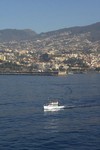One or two people have asked what I’ve been doing whilst I’ve been on the ship – but the time seems to have passed pretty quickly. Besides reading, catching up with correspondence and trying to organise mobile phones/accommodation/insurance and other dull things that are needed for life in the UK, we’ve been involved in helping with some of the ship’s work, too. I was fully expecting to be given a pot of paint and told to go and make something look less rusty, but it turns out that painting a ship requires skill, technique and an ability to use the evil-sounding air-powered paint scraping guns, so we’ve been assigned some other duties. Amongst other things I’ve helped to: clean the beer store (hot and smelly), pack away Uta’s instruments and stow them in the hold, test the fire alarms, test the fire hoses, test the fire hydrants and clean and pack away the inflatable boats. I’ve also fixed a few computers, inevitably! We’ve also done lots of drills – lifeboat drill, liferaft drill (complete with an out-of-date liferaft which later was turned into a paddling pool!) a fire drill and a major incident exercise. The ship’s crew have to stay familiar with what to do in an emergency as any help could be several days away.

The liferaft, reincarnated as a paddling pool – it would normally have a bright orange cover
There’s also entertainment on board – we had a barbecue on the aft deck to celebrate crossing the Equator last week, and Ags organised a quiz night. Because the ship’s food is plentiful and excellent, we’ve also been doing circuit training (not usually my cup of tea at all!) in the main hold with Rich the Purser, who makes us all work for our supper. Doing certain exercises (notably press-ups and star jumps) on a moving ship is a bit tricky!

Through the Atlantic Ocean
Today we’ve called at Funchal in Madeira to do an exchange of passengers – Uta and Vsevvy have got off and will fly home, and we’ve picked up three engineers who are going to look at the ship’s power systems, part of which are being replaced when it’s drydocked later in the month. Duncan the Chief Engineer very kindly gave us a tour of the engine room last week and explained what this will mean. JCR is a diesel-electric ship, which means that the propeller is driven by two huge electric motors, which are in turn powered by diesel generators. The reason for doing this is that it significantly reduces the amount of engine noise the ship puts into the water – and engine noise can seriously muck up any scientific work that relies on sonar or acoustics. The whole ship is designed to be as quiet as possible and this is noticeable all over the vessel – there’s much less noise and vibration than on the Ernest Shackleton, particularly on the aft deck. The control system that’s being replaced takes three-phase power from the generators and produces a controlled DC supply that drives the electric motors. This system provides the ship’s speed control and reversing, and also couples into the power management system. There are four diesel generators (two large, two small) and the system starts and stops them automatically depending on the amount of power required to drive the ship and power all the auxilliary systems. Anyway, replacing the power control will be a major job and needs to be got right!

Ags has her first sight of Madeira
We didn’t actually go into harbour at Funchal – we approached the harbour and then held off out of the way, using the dynamic positioning system to keep the ship stationary (the DP system uses GPS to control the ship’s engines and thrusters and can hold it steady or make it move along a defined course) whilst a boat came out to meet us and transfer the passengers.

Approaching Funchal

“I see no ships!” – The First Officer (Tim) and Captain (Jerry) looking for the transfer boat

The transfer boat, “Scotia”, coming out to meet us






